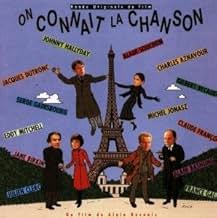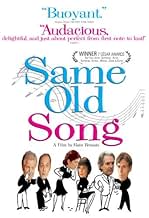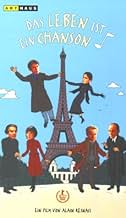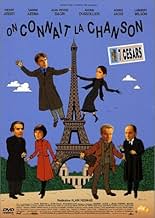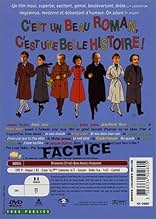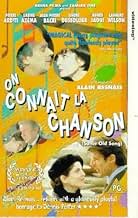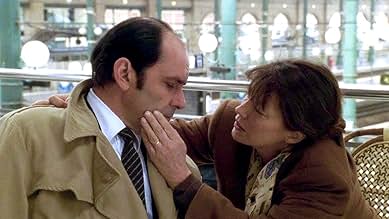VALUTAZIONE IMDb
7,3/10
4576
LA TUA VALUTAZIONE
Una storia musicale su come le persone trovano il loro amore per le strade della bellissima Parigi.Una storia musicale su come le persone trovano il loro amore per le strade della bellissima Parigi.Una storia musicale su come le persone trovano il loro amore per le strade della bellissima Parigi.
- Regia
- Sceneggiatura
- Star
- Premi
- 10 vittorie e 9 candidature totali
Recensioni in evidenza
6gans
The sing-along idea is clever and well-implemented, but the story goes around in circles and above all the film is too static to support the musical premise. It's sad to see such lackluster direction from the creator of _Hiroshima mon amour_. If you like Jaoui and Bacri, go see _Le gout des autres_!
I will always go out of my way - in December last year I tracked down a tiny theatre - capacity roughly 50 - in a Parisian alley to catch a performance of their 'Un air de famille' (yes, it was great, thanks for asking) to see anything written by Jean-Pierre Bacri and Agnes Jouai, and if they are performing as well, as they do in this movie, then that is icing on the cake. I tend to associate Resnais with pretentious intellectual 'popcorn' movies like Last Year At Marienbad and Hiroshima, Mon Amour so it makes a welcome change to discover that he can turn his hand to mainstream and deliver, with a little help from a great script and great acting from Bacri and Jouai, a great feel-good movie. The usual suspects - Andre Dussolier, Pierre Arditi, etc are on hand and turn in the usual above par performances. This is one to savor. 8/10
In the unapproximate center of "On connaît la chanson," find a marvelous joke that missed by everyone at the sold out SFIFF screening I attended. If you want to try to catch it yourself, then don't read on! I'm writing to those of you who didn't or won't catch it. Four or five characters are seated chatting or arguing, I forget, round a table in a busy restaurant. As you know from other comments here, the script incorporates line fragments from well-known French songs (kind of like those "hidden picture" puzzles in the dentist office magazine). As each occurs, someone bursts into song. One of our group, after an unremarkable, perfectly conversational pause, says "je ne regret rien," then pauses, as does everyone else round the table. They look at one another, everyone at everyone, the very clatter of the restaurant seems to pause, waiting, and for the only time in this film, nobody takes the cue. Nobody breaks into the Piaf standard.
This film is light, but not empty. Following the interconnected lives of several Parisian bourgeois, the film uses snippets of popular music to demonstrate the emotional state of the characters in the style of a conventional musical. However, the music does both more than this and less. The characters do not sing their parts so much as lip-sync (badly) to tunes that one hears on the radio or in a movie. The songs are related to the characters' "inner lives" as a Nike swoosh or a Dior label would be - and that's the point. Each character has a musical style of sorts and maybe even a theme song, but the song "belongs" to the character like motion "belongs" to a jelly-fish. The characters, like the jelly-fish that are a motif of the finale scene, are less than unique, and much less than in control. However, they are at the same time quite human and sympathetic.
Resnais, whom I count as being one of cinema's great geniuses, has a similar approach in On connaît la chanson as he does in Mon oncle d'Amérique, with pop songs in lieu of mice and jelly-fish in lieu of Henri Laborit. (See the info on the latter movie if this doesn't make sense...) What both films do is make one think about important questions of the complex relationship between brains, minds, and souls, and they do so without clobbering the viewer over the head with preachiness and over-simplifications. Contrast this with the sermonizing of the abominable Lars von Trier (of Dancer in the Dark fame) as well as with the mindless drek that that is generally shown in U.S. theaters.
Resnais, whom I count as being one of cinema's great geniuses, has a similar approach in On connaît la chanson as he does in Mon oncle d'Amérique, with pop songs in lieu of mice and jelly-fish in lieu of Henri Laborit. (See the info on the latter movie if this doesn't make sense...) What both films do is make one think about important questions of the complex relationship between brains, minds, and souls, and they do so without clobbering the viewer over the head with preachiness and over-simplifications. Contrast this with the sermonizing of the abominable Lars von Trier (of Dancer in the Dark fame) as well as with the mindless drek that that is generally shown in U.S. theaters.
it's a simple funny film that talks about few people who know each other or get to know each other afterward. The aspect that makes it differ from other movies is that the protagonists sing often their feelings or ideas! The used songs are popular French songs that are well known by everybody in France. I liked it in general but it is not a plot that interests me that much since the most of these relations were not that interesting for me. The most important human aspect that was shown in this movie is that many things are not as they seem to be! Some people show that they are strong and have great achievements and they have everything under control but they are not that achieving! They have to accept that they are only normal people and show their true selves to the others.
Lo sapevi?
- QuizThe film is dedicated to the memory of Dennis Potter, and is in the style of Potter's lip-sync musicals like Pennies from Heaven (1978), The Singing Detective (1986) and Lipstick on Your Collar (1993).
- ConnessioniFeatured in 6 à la maison: Episodio datato 27 gennaio 2021 (2021)
- Colonne sonoreJ'ai Deux Amours
Music by Vincent Scotto
Lyrics by Georges Koger and Henri Varna
Performed by Josephine Baker
I più visti
Accedi per valutare e creare un elenco di titoli salvati per ottenere consigli personalizzati
- How long is Same Old Song?Powered by Alexa
Dettagli
- Data di uscita
- Paesi di origine
- Sito ufficiale
- Lingue
- Celebre anche come
- Same Old Song
- Luoghi delle riprese
- Hôtel Meurice - 228 Rue de Rivoli, Paris 1, Parigi, Francia(opening scene: Camille tells about von Choltitz in front of the hotel)
- Aziende produttrici
- Vedi altri crediti dell’azienda su IMDbPro
Botteghino
- Budget
- 7.900.000 € (previsto)
- Tempo di esecuzione2 ore
- Colore
- Mix di suoni
- Proporzioni
- 1.85 : 1
Contribuisci a questa pagina
Suggerisci una modifica o aggiungi i contenuti mancanti

Divario superiore
By what name was Parole, parole, parole... (1997) officially released in India in English?
Rispondi
